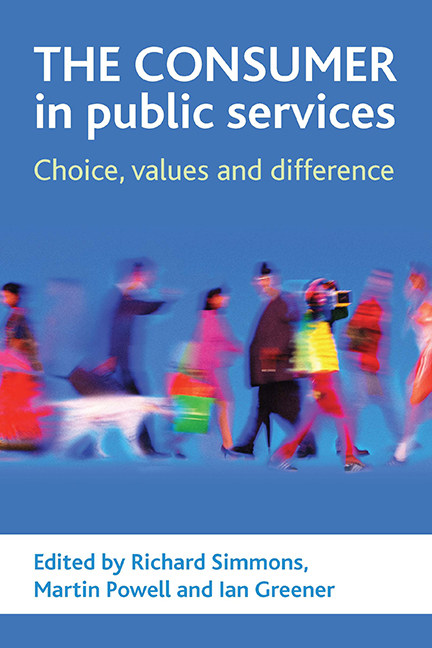Book contents
- Frontmatter
- Contents
- List of figures and tables
- Acknowledgements
- Notes on contributors
- Foreword
- one Introduction: managing the ‘unmanageable consumer’
- two The consumer and New Labour: the consumer as king?
- three Narratives of public service delivery in the UK: comparing central and local government
- four Understanding the ‘differentiated consumer’ in public services
- five Differentiating consumers in professional services: information, empowerment and the emergence of the fragmented consumer
- six The healthcare consumer
- seven The consumer in education
- eight The consumer and social housing
- nine The people’s police? Citizens, consumers and communities
- ten The consumer in social care
- eleven Differentiated consumers? A differentiated view from a service user perspective
- twelve Authoritative consumers or experts by experience? User groups in health and social care
- thirteen The public service consumer as member
- fourteen Conclusion: the consumer in public services
- Index
four - Understanding the ‘differentiated consumer’ in public services
Published online by Cambridge University Press: 22 January 2022
- Frontmatter
- Contents
- List of figures and tables
- Acknowledgements
- Notes on contributors
- Foreword
- one Introduction: managing the ‘unmanageable consumer’
- two The consumer and New Labour: the consumer as king?
- three Narratives of public service delivery in the UK: comparing central and local government
- four Understanding the ‘differentiated consumer’ in public services
- five Differentiating consumers in professional services: information, empowerment and the emergence of the fragmented consumer
- six The healthcare consumer
- seven The consumer in education
- eight The consumer and social housing
- nine The people’s police? Citizens, consumers and communities
- ten The consumer in social care
- eleven Differentiated consumers? A differentiated view from a service user perspective
- twelve Authoritative consumers or experts by experience? User groups in health and social care
- thirteen The public service consumer as member
- fourteen Conclusion: the consumer in public services
- Index
Summary
Introduction
As we have seen, ‘choice’ and ‘voice’ have become watchwords of current policy and provision in the public services. Current debates often focus on notions of ‘choice’. Alongside these debates, ‘voice’ is often acknowledged as being related and of certain value, although it has been claimed to be a less influential driver of change:
Evidence points to choice serving as an important incentive for promoting quality, efficiency and equity in public services – and in many cases more effectively than relying solely or largely upon alternative mechanisms such as ‘voice’. (Cabinet Office, 2005, p 3)
We argue here and elsewhere that both choice and voice have their merits (Simmons et al, 2006a), based on the need that users identify for ensuring that providers listen to what they have to say. While notions of choice invite images of public service users ‘shopping around’ for the best provider, the best appointment time, the best housing and so on, there are different elements to people's relationships with the public services they use, which mean that it is ‘not like shopping’ (Clarke, 2005; this volume, Chapter Nine). Recognising this, Hoggett (2003, p 2) argues that the public sector has two unique characteristics:
It is the site for the continuous contestation of public purposes and it is an essential means of containing social anxieties. Such characteristics serve to remind us that the public sector is primarily a site for the enactment of particular kinds of social relations rather than a site for the delivery of goods and services. To reduce it to the latter is to commodify such relationships, to strip them of their moral and ethical meaning and potential.
Given these conditions of ‘contestability’, in addition to the relative unavailability of ‘exit’ that is widely recognised in public services, voice may also be seen as important if people's interests are to be adequately taken into account. Voice provides a mechanism through which users can negotiate – either as individuals or collectively. This is particularly important for public services, where the extent to which collective as well as individual benefits are provided is generally acknowledged to be high.
- Type
- Chapter
- Information
- The Consumer in Public ServicesChoice, Values and Difference, pp. 57 - 76Publisher: Bristol University PressPrint publication year: 2009

